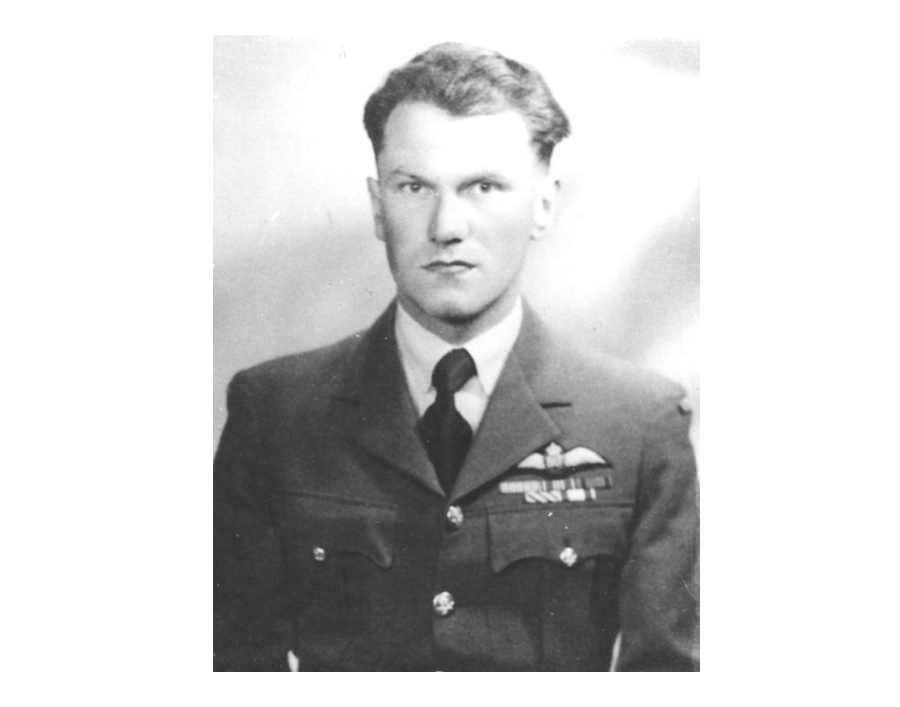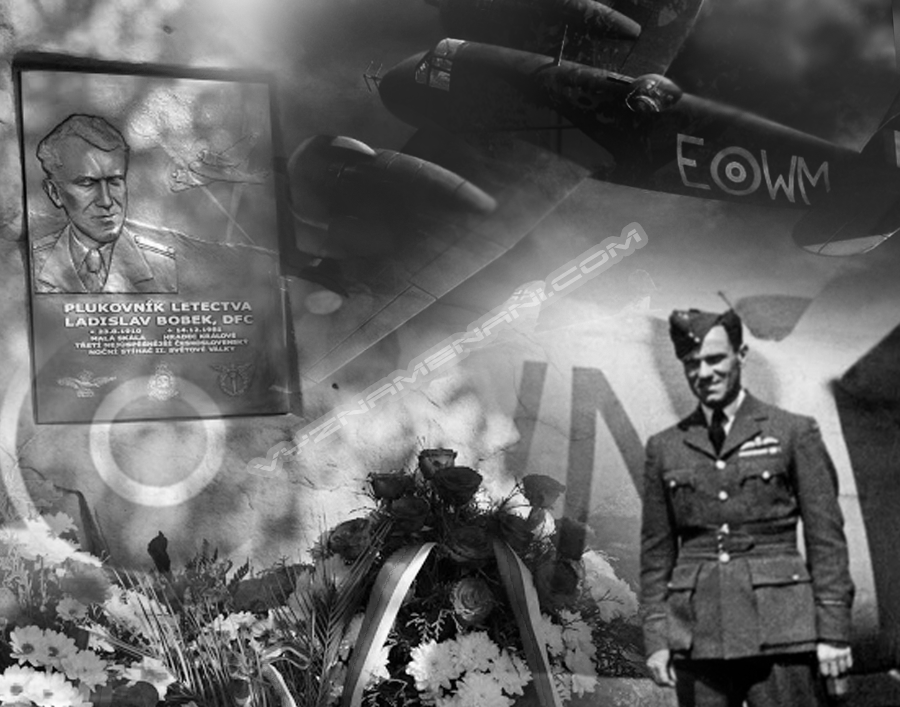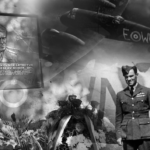
Ladislav Bobek was born on 23 August 1910, in Malá Skála, Czechoslovakia. At aged eighteen he enrolled in the Military Aviation Academy at Prostějov in 1927, graduating from there two years later, and was assigned to complete his fighter pilot training in the town of Cheb. In October 1931, Sergeant Bobek underwent a night flying course, accumulating seventy flying hours. He served from 1930 to January 1938, as a fighter pilot in various squadrons of the 4th Air Regiment in Hradec Králové he served mainly with his No. 66 Scout Squadron. Bobek also held the position as an instructor at VLU in Prostějov and at the fighter school in Hradec Králové. From January 1938 until the disbanding of the Czech Forces by the Germans in March 1939, he served as a fighter pilot with No. 34 Squadron, 1 Air Regiment TG Masaryk, equipped with the Avia B-534 biplane, at Měnín, near Brno and then in Нaršany in Slovakia.
Following the occupation of his country by Germany in March 1939, Bobek accompanied by two other colleagues, crossed the border illegally into Poland on 19 July 1939. On 29 August, Bobek enlisted in the Polish Air Force with the rank of Sergeant, and he was posted to the Deblin air base. As a pilot he flew mainly reconnaissance and liaison flights in the Potez 25 biplane. Bobek flew about from twenty to thirty flying hours in the Polish Air Force. With Russian army invading Poland from the east, he was made prisoner by the Red Army troops on 18 September, near Kowel. Together with other Czechoslovak soldiers and pilots, he was interned in Oranky, near Nizhny Novgorod, in Russia. Negotiations on release of the Czechs from internment followed, he stayed in Soviet internment for nine months, and then on 20 June 1940, a group of 33 pilots including Bobek was selected to leave the Soviet Union. The group transferred to Suzdal, before leaving on a train for Odessa, and via Moscow arrived at the port of Odessa and from there on 26 June, aboard the ship SS Svanetia, arriving in Istanbul, Turkey on 11 July. On arrival in Turkey they contacted the British Embassy, and with their help the group sailed for the UK, they travelled by ship via the Suez, Aden, Bombay, arriving in Liverpool on 27 October 1940.
Bobek enlisted in the RAFVR as an Aircraftsman 2nd Class, and a few days later he was promoted to Sergeant. In January 1941, he had a short course at the CFS in Upavon, and he was promoted to Warrant Officer in March 1941. After converting onto British aircraft Bobek served as a test pilot with No. 29 MU at High Ercall from 21 March, and from 3 May with No. 46 MU at Lossiemouth. He then began training as a night fighter at No. 53 OTU at Church Fenton, where Sergeant Bohuslav Kovařík became his Radar Operator. Kovařík already had flown an operational tour in Wellington bombers with No. 311 Squadron RAF. On 12 February 1942, Bobek was posted to No. 68 Squadron RAF a night fighter unit, flying the Bristol Beaufighter Mk.IF at Coltishall, in Norfolk. He was involved in an accident on 27 April, when he flew a patrol during which his aircraft Beaufighter „T4631“ hit a target drogue wire and spun into the ground near Coltishall, however both Bobek and Kovařík survived the incident.
He achieved his first victory on the night of 28/29 April 1942, a Do 217 shot down off the Yarmouth coast. On 19/20 September 1942, after damaging another Do 217, their own aircraft was hit by return fire from the bomber gunners and was damaged, Bobek landed his Beaufighter „V8283“ safely back at RAF Coltishall. He was awarded the DFC by His Majesty King George VI in August 1942. On 12 March 1943, his Beaufighter was badly damaged by a gunner of a British RAF Halifax bomber, with his engine on fire Bobek managed an emergency landing, with his aircraft wheels up at an airfield unhurt. By now Bobek had been promoted to Pilot Officer and Kovařík was promoted to the rank of Warrant Officer. On 28 March, he shot down a Ju 88 east of Lowestoft, but his own aircraft Beaufighter „V8749“ was badly damaged by return fire from the Junkers gunner, the enemy fire hit the starboard engine and the aircraft’s rudder and elevators. Bobek made a forced landing at Coltishall and he and his Radar Operator Kovařík were uninjured. In July 1943, Bobek completed his tour of duty and left the squadron, he had by now been promoted to Flying Officer. He was posted to work at the Czechoslovak Inspectorate of the Air Force in London, and then at the Czech Air Depot in St. Athan, he also underwent an instructor course and eventually flew newly manufactured aircraft to the units as a member of the No. 1 Delivery Flight based at Croydon. BBobek returned to operational flying on 1 February 1944, returning to 68 Squadron to commence his second tour of duty again with Flight Sergeant Kovařík as his Radar Operator, it should be Flying Officer not Flight Sergeant. In July, he underwent conversion onto Mosquito NF.Mk.XVII night fighters however, due to the lack of the Luftwaffe’s activity, he added no more kills. On 31 July 1944, he was withdrawn from operational flying and posted to Czech Depot at Cosford. On 27 October, he was sent to serve as a flying instructor with No 2 F.I.S at Montrose, and was later promoted to the rank of Flight Lieutenant. In December, Bobek was assigned to No. 84 Group Communications Squadron RAF as a transport pilot, flying mainly Avro Anson’s till the end of hostilities in Europe.
After returning to Czechoslovakia in August 1945, Captain Bobek served as Flight Commander with No. 2 Air Transport Group operating from Prague’s Ruzyně and Kbely airports. And when the Air Transport Group was disbanded on 1 January 1946, he started flying with the Air Transport Regiment in Prague – Kbely as CO of No. 2 Flight. In May 1947, he was posted to the Hradec Kralove Military Aviation Academy and instructing the cadets in flying twin-engined aircraft. On 7 March 1949, Bobek was placed on leave, and on 31 July, and he was sacked by the communists and he left the Air Force. Bobek fell seriously ill with tuberculosis and thrombosis in his legs followed, and due to the condition of his health, it prevented him from being imprisoned like dozens of other Czech servicemen. Ladislav Bobek died on 14 December 1981, and in accordance with his „moral“ and political rehabilitation he was posthumously promoted to the rank of Colonel of the Air Force.

Ladislav amassed the total of at least 3,398 flying hrs, 2,029 of which piloting single-engined aircraft day and 70 hours night. 872 hrs were on multi-engined ones day and 436 hours night. He flew at least 82 types of aircraft including a lots of their variants.
Awards
- Czechoslovak War Cross 1939–1945
- Czechoslovak Medal for Valour
- Czechoslovak Medal of Merit 1st Class
- Commemorative Medal of Czechoslovak Army Abroad with Clasp
- Polish War Cross (Poland)
- DFC (British)
- The 1939-1945 Star (British)
- Air Crew Europe Star with France and Germany Clasps (British)
- Defence Medal (British)
- War Medal 1939-1945 (British)
- The Atlantic Star (British)
- Medal World War for Civilization (British)











